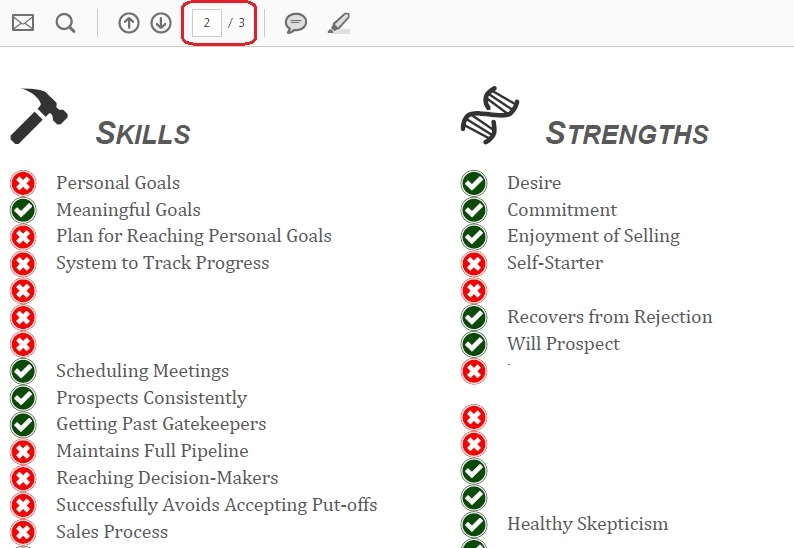Do your salespeople need to be trained or coached? As you may know, we use the OMG Sales Assessment with our clients. Every assessment has a summary of findings that we don't typically share with our client until the end of our engagement. This is an excerpt from one of those summaries.

Three things:
- Don't get distracted by the white space. I hid some detail so that we could focus on the title.
- Notice that this is an excerpt from page 2 of a 3 page document. Again, for focus. There's a lot of data in them pages.
- Red means that the salesperson does not have it. Green means they do.
When Carole and I work with someone and we determine that they have an issue with something in sales, we ask ourselves two questions.
- Do they know what to do? (Do they have the skill?)
- Can/will they do it? (Do they have the strength or are they challenged by a weakness or an obstacle?)
Look at the top of both lists. How can someone have Desire and Commitment and Enjoy Selling, but not be a self starter? Why would someone have meaningful goals, but they not be personal and why don't they have a plan to reach them or a system to track their progress?
Follow my thinking here. So, this salesperson
- Will Prospect
- Prospects Consistently
- Recovers From Rejection
- Gets Past Gatekeepers
- and Schedules Meetings
but they STILL don't
- maintain a full pipeline
- reach decision makers
- avoid putoffs
and even though their employer has a well documented sales process, they can't use it.
So, consequently, 75% of salespeople don't know what their doing and 40% of them miss their number.
Who do you coach? Who do you train?
If only one or a few of your people have an issue, 1:1 is the answer and recognize that multiple short sessions are more effective than less frequent long sessions. I know that it's more convenient for you to have longer sessions, but is your priority your convenience or their growth?
Group goal setting sessions can suggest, but can often be unsettling to salespeople that are 'intimidated' by some of their co-workers "Big Hairy Audacious Goals". However, very few sales managers can help salespeople set personal goals unless the personal goals were identified during the sales interview process. What salesperson is going to tell his manager that company success isn't as important as success as a parent, spouse, etc.? Really personal, meaningful goals might be to earn enough money to start a company, work less, or qualify for a position elsewhere and fear of being terminated might prevent your empoyee's total candor.
If everybody on your team needs help in a particular area, you can often do a group thing, but watch for blank stares. Remember, they may know what to do, but some self limiting belief keeps them from doing it and digging for that belief cannot happen in group.



